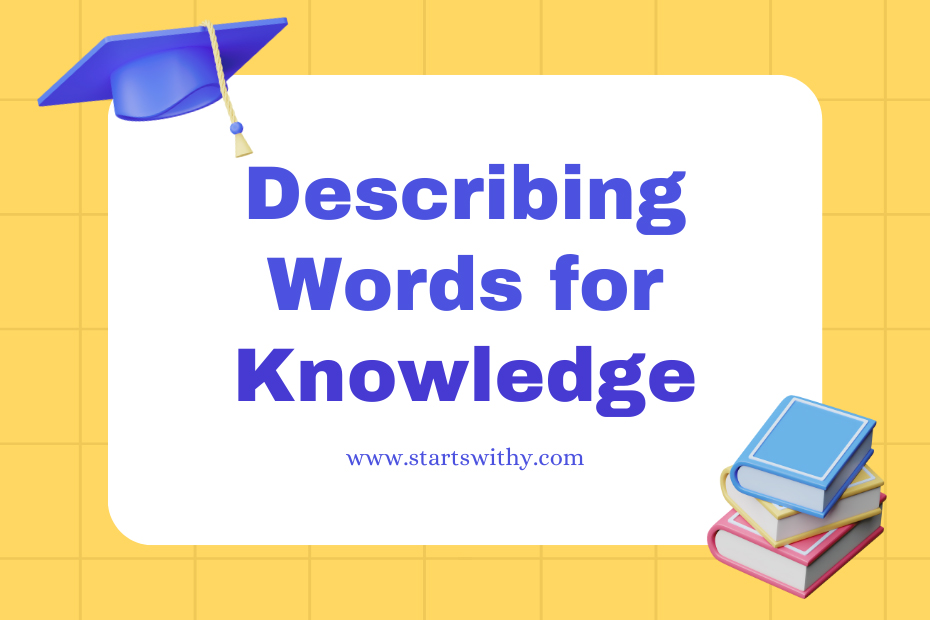Are you tired of using the same old adjectives to describe knowledge? Well, look no further! In this article, I’ll introduce you to a wide range of descriptive words that will take your descriptions of knowledge to the next level. Whether you’re writing an essay, giving a presentation, or simply want to enhance your vocabulary, these adjectives will help you articulate the nuances of knowledge with precision and flair.
How to Describe knowledge? – Different Scenarios

When it comes to describing knowledge, there are various scenarios and contexts in which we can use different adjectives to paint a more vivid picture. Here are some examples of how to describe knowledge in different scenarios:
1. Academic or Intellectual Knowledge:
- Focus: Depth of understanding, critical thinking, ability to analyze and synthesize information.
- Keywords: Comprehensive, theoretical, analytical, critical, evidence-based, research-oriented, nuanced.
- Example: “She possesses a deep and comprehensive knowledge of political philosophy, evidenced by her insightful critiques of historical and contemporary theories.”
2. Practical or Hands-on Knowledge:
- Focus: Ability to apply knowledge to solve problems and complete tasks effectively.
- Keywords: Skillful, practical, applied, adaptable, efficient, resourceful, results-oriented.
- Example: “He has extensive hands-on knowledge of carpentry, able to build complex furniture with precision and efficiency.”
3. General or Everyday Knowledge:
- Focus: Breadth of understanding of common topics and concepts.
- Keywords: Well-rounded, informed, versatile, adaptable, common-sense, relatable, conversational.
- Example: “She demonstrates a strong general knowledge, readily engaging in conversations on various topics from current events to pop culture.”
4. Cultural or Historical Knowledge:
- Focus: Understanding of specific cultures, traditions, and historical events.
- Keywords: Deep-rooted, in-depth, contextual, nuanced, sensitive, insightful, informed.
- Example: “He possesses a wealth of cultural knowledge, able to navigate diverse social situations and understand historical contexts with sensitivity.”
5. Specialized or Technical Knowledge:
- Focus: Expertise in a specific field or domain.
- Keywords: Advanced, detailed, proficient, specialized, technical, jargon-savvy, industry-specific.
- Example: “She has specialized knowledge in astrophysics, able to interpret complex scientific data and explain them to a non-technical audience.”
Remember, the way we describe knowledge can vary depending on the specific context or scenario. By using descriptive adjectives, we can provide a more accurate and nuanced portrayal of someone’s knowledge and expertise.
Describing Words for knowledge in English
When it comes to describing knowledge, there are numerous adjectives that can help paint a vivid picture of someone’s expertise. In this section, I’ll provide you with a list of descriptive words that you can use to enhance your descriptions of knowledge. Whether you’re teaching kindergarten students, preschoolers, or simply looking for easy words to teach kids, these adjectives will come in handy.

- Profound: Having deep understanding or insight.
- Scholarly: Possessing extensive knowledge gained through academic study.
- Erudite: Displaying great knowledge or learning.
- Expert: Having a high level of skill or knowledge in a particular subject.
- Seasoned: Experienced and knowledgeable through years of practice or exposure.
- Skilled: Possessing the ability and knowledge to perform a task proficiently.
- Well-informed: Having a thorough understanding of a wide range of topics.
- Versatile: Capable of applying knowledge in various situations or contexts.
- Informed: Having up-to-date knowledge on a specific subject.
- Cultural: Possessing knowledge of and appreciation for different cultures.
- Historical: Having a deep understanding of past events and their significance.
- Well-read: Having read extensively on a wide range of topics.
- Technical: Possessing specialized knowledge in a specific technical field.
- Niche: Having expertise in a particular specialized area.
- Cutting-edge: Having the most recent and advanced knowledge in a field.
By using these descriptive adjectives, you can create a more accurate and nuanced portrayal of someone’s knowledge and expertise. Whether you’re describing academic knowledge, practical skills, or general knowledge, these words will help you paint a clearer picture.
Adjectives for knowledge

Positive Adjectives for Knowledge with Example Sentences
When describing knowledge, it’s important to choose adjectives that convey a positive and favorable impression. Here are 12 examples of positive adjectives that can be used to enhance descriptions of knowledge:
- Profound: My teacher has a profound knowledge of history and always shares fascinating insights with us.
- Scholarly: The professor’s scholarly knowledge of literature is evident in her thought-provoking analysis.
- Erudite: The author’s erudite knowledge of philosophy is showcased in his well-researched book.
- Expert: She is an expert in mathematics and can solve the most complex problems effortlessly.
- Seasoned: After years of experience, the chef has a seasoned knowledge of flavors and creates delicious dishes.
- Skilled: The engineer’s skilled knowledge of technology allows her to develop innovative solutions.
- Well-informed: The journalist is well-informed on current events and always provides accurate information.
- Versatile: Our teacher has a versatile knowledge of multiple subjects, making the lessons engaging and diverse.
- Informed: The lawyer’s informed knowledge of the case led to a convincing argument in court.
- Cultural: The anthropologist has a cultural knowledge that enriches our understanding of different societies.
- Historical: The historian’s historical knowledge brings the past to life and deepens our appreciation of it.
- Well-read: She is well-read in classic literature, and her knowledge of literary works is impressive.
Negative Adjectives for Knowledge with Example Sentences
Not all knowledge is positive or desirable. Sometimes, it’s necessary to describe knowledge in a negative light. Here are 5 examples of negative adjectives that can be used to convey a less favorable impression:
- Superficial: His knowledge of the subject is superficial, as he only knows the basics and lacks depth.
- Limited: The accountant’s limited knowledge of tax law resulted in several costly errors.
- Outdated: The researcher’s knowledge of recent advancements in the field is outdated and no longer relevant.
- Incomplete: The student’s knowledge of the topic is incomplete, as they missed several key concepts.
- Misguided: His knowledge of the subject is misguided, as he relies on inaccurate information and misconceptions.
Remember, when using adjectives to describe knowledge, choose words that accurately reflect the level of expertise and understanding. Using the right adjectives can help create a more nuanced portrayal and enhance your descriptions.
| Adjective | Example Sentence |
|---|---|
| Profound | My teacher has a profound knowledge of history and always shares fascinating insights with us. |
| Scholarly | The professor’s scholarly knowledge of literature is evident in her thought-provoking analysis. |
| Erudite | The author’s erudite knowledge of philosophy is showcased in his well-researched book. |
| Expert | She is an expert in mathematics and can solve the most complex problems effortlessly. |
| Seasoned | After years of experience, the chef has a seasoned knowledge of flavors and creates delicious dishes. |
| Skilled | The engineer’s skilled knowledge of technology allows her to develop innovative solutions. |
| Well-informed | The journalist is well-informed on current events and always provides accurate information. |
| Versatile | Our teacher has a versatile knowledge of multiple subjects, making the lessons engaging and diverse. |
| Informed | The lawyer’s informed knowledge of the case led to a convincing argument in court. |
| Cultural | The anthropologist has a cultural knowledge that enriches our understanding of different societies. |
| Historical | The historian’s historical knowledge brings the past to life and deepens our |
Synonyms and Antonyms with Example Sentences

Synonyms for Knowledge
When it comes to describing knowledge, there are several synonyms that can be used to add depth and variety to your descriptions. Here are some examples:
- Wisdom: Wisdom implies a deep understanding and experience. For example, “He possesses great wisdom in solving complex puzzles.”
- Expertise: Expertise suggests a high level of skill and proficiency in a particular field. For instance, “She has extensive expertise in painting.”
- Proficiency: Proficiency refers to a high level of competence and capability. For instance, “His proficiency in mathematics makes him an excellent tutor.”
- Acumen: Acumen indicates sharpness of mind and keen insight. For example, “Her business acumen enables her to make smart decisions.”
- Insight: Insight refers to a deep understanding or perception about a subject. For instance, “He offered valuable insights during the discussion.”
- Mastery: Mastery implies complete command and control over a subject or skill. For example, “He has achieved mastery in playing the piano.”
Here’s a table summarizing these synonyms along with their definitions:
| Word | Definition |
|---|---|
| Wisdom | Deep understanding and experience |
| Expertise | High level of skill and proficiency |
| Proficiency | High level of competence and capability |
| Acumen | Sharpness of mind and keen insight |
| Insight | Deep understanding or perception about a subject |
| Mastery | Complete command and control over a subject or skill |
Antonyms for Knowledge
Sometimes, when describing knowledge, we might want to convey a lack of understanding or a lesser degree of expertise. Here are some antonyms to consider:
- Ignorance: Ignorance indicates a lack of knowledge or information. For example, “His ignorance about history was evident.”
- Inexperience: Inexperience suggests a lack of practice or exposure to a particular subject. For instance, “Due to his inexperience, he struggled with the difficult task.”
- Naivety: Naivety refers to a lack of sophistication or worldly understanding. For example, “Her naivety about politics was evident in her statements.”
- Unfamiliarity: Unfamiliarity suggests a lack of knowledge or awareness about something. For instance, “Due to his unfamiliarity with the topic, he struggled to comprehend.”
- Incompetence: Incompetence indicates a lack of skill or ability in a specific area. For example, “His incompetence in the subject was apparent in his performance.”
Here’s a table summarizing these antonyms along with their definitions:
| Word | Definition |
|---|---|
| Ignorance | Lack of knowledge or information |
| Inexperience | Lack of practice or exposure to a particular subject |
| Naivety | Lack of sophistication or worldly understanding |
| Unfamiliarity | Lack of knowledge or awareness about something |
| Incompetence | Lack of skill or ability in a specific area |
By utilizing these synonyms and antonyms, you can effectively convey different levels of knowledge and expertise within your writing, bringing richness and nuance to your descriptions.
Conclusion
In this article, I have explored the various adjectives that can be used to describe knowledge. By using these descriptive words, writers can effectively convey the level of expertise and understanding in their descriptions.
Throughout the article, I have provided a comprehensive list of synonyms and antonyms for describing knowledge. These synonyms, such as wisdom, expertise, proficiency, acumen, insight, and mastery, allow writers to paint a vivid picture of someone who possesses deep understanding and skill in a particular field. On the other hand, the antonyms, including ignorance, inexperience, naivety, unfamiliarity, and incompetence, highlight the lack of knowledge or expertise.
By incorporating these adjectives into their writing, writers can create more engaging and descriptive content. Whether it’s describing a knowledgeable professor or an inexperienced student, these adjectives offer a range of options to accurately portray the level of knowledge and expertise.
The use of these adjectives enhances the quality of writing by providing a more nuanced and detailed description of knowledge. So, next time you want to convey someone’s level of understanding, remember to utilize these descriptive words to make your writing more impactful.



